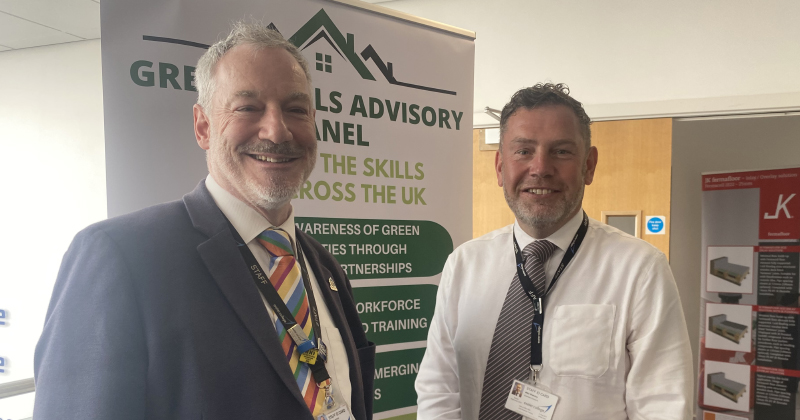If the UK hits its net-zero target by 2050, it could be in part thanks to a little-known college-led network, the Green Skills Advisory Panel, set up to help solve the green skills shortage.
What began three years ago as a project led by Exeter College to bring together representatives from construction firms, colleges, training providers and government agencies for the south west, has morphed into a network extending as far as east Africa.
GSAP’s “changemakers” join forces at conferences and online in an attempt to decipher ever-changing net-zero policies and make the most of funding pots to get much-needed retrofitters, heat pump and solar panel installers trained up.
Eighteen UK regions now have their own GSAPs planned, with more in Malawi and Nepal. Discussions are taking place about launching one in Morocco.
Risky net ventures
This is mainly thanks to the work of GSAP’s chair, Exeter College executive director of partnerships and apprenticeships Mike Blakeley. He has lofty ambitions for GSAP to become “the leading voice of green skills in the country”, and adds: “I’d be massively proud because this country desperately needs it.”
Blakeley grew up in Torbay, where an imposing sea wall acts as a constant reminder of the grim consequences of climate change.
His passion for net zero is not puritanical, however. He still eats meat and travels regularly by plane. He once held a job with a different ‘net’ – crabbing on a deep sea fishing boat – and knows “what it’s like to be out there in a force eight gale with 20 foot waves crashing over”.
This speaks volumes about Blakeley’s appetite for risk, which is perhaps partly why he is so attracted to the notoriously high-stakes green skills agenda.
Part of the problem with ramping up green skills provision is FE is risk averse, he says.
While colleges in Sheffield, West London and South Wales have also boldly seized the mantle, some others “just don’t see it as their job to do this stuff”.
Electric dreams
But Exeter has “done the hard yards”. Blakeley says: “We know what it takes to set up a really good air-source heat pump or solar training centre, so people can learn from us.”
Exeter College’s proposed merger with Petroc College in north Devon is “exciting” for Blakeley as it would unlock opportunities to train workers for offshore wind farms being developed off the north Devon coast, part of a wider ‘Celtic flow’ scheme aimed at powering up millions of homes.
He has already written to one of the world’s largest offshore wind developers, asking for “insight” into its skills development plan. Blakeley believes the boats used to service the wind farms will be hydrogen-powered, so his team have also now begun work with partners to better understand that technology too.
“I feel privileged that I can look into some of these brilliant things,” he says.
Blakeley and I meet at the Voco Zeal hotel at Exeter’s Science Park, which recently opened becoming the first net-zero hotel in western Europe, and is almost entirely clad with vertical solar panels. Exeter College will soon be applying the technology at its own solar training centre.
Blakeley believes cladding all industrial buildings with solar roof and side panels would put the UK “ahead of the game” in hitting net zero and would remove the need for solar farms.
Not properly skilling up tradespeople for retrofitting can have dire consequences. Homes across the country have been rendered unsellable after being improperly insulated with spray foam. Blakeley puts such “bad news stories” down to the “underdevelopment of green skills,” which has led to those tasks being undertaken by “jobbing builders who don’t actually know what they’re doing, so it ends up as a disaster”.
Blakeley was inspired to take his GSAP movement national so regions could learn from other people’s mistakes in setting up green skills initiatives, as “the effort being put in to solve individual problems was immense”.
“With no national framework or network that sets out what we’ve actually got to do, you just get these initiatives whizzing like cheap fireworks – someone’s lit a match, and we’ve gone ‘bang’,” he says.
Beyond token gestures
Many building projects in the south west now have “some net-zero elements” such as a few solar panels, as “the token gestures are easy”. “We’re finding it harder to gain traction with the harder things,” Blakeley explains.
Labour shortages meant a retrofitting project in Exeter, intended to take six months, hadn’t been completed two years later, and no work can currently take place on a site in Plymouth designated for 50 affordable homes.
“There’s a tiny pool of labour that jumps between whoever wins the contract, but it’s never enough to deliver whole project areas. It’s an impossible challenge unless everyone works together.”
Exeter College has taken the initiative by launching a new construction innovation centre in an old industrial unit on the edge of town. It is also an overspill for its roofing skills provision, which has expanded by 300 learners since last year.
Part of the problem is that although skills plans are sometimes laid out in planning applications, because local authorities do not hold construction firms to account for them, many never happen.
Instead, Blakeley would like to see councils, contractors and training providers or colleges drawing up what he calls “skills plans plus” for large construction projects and green initiatives, to “create the formula for jobs”.

GSAP in action
Today I am attending one of the three networking conferences that his South West GSAP holds each year.
“This isn’t a talking shop – it’s about action,” GSAP’s chair, local consultant AJ Eaton, tells an audience of 80 people, mainly from the building trade, colleges and training providers.
“By bringing our FE providers on that journey with us we can make a massive difference,” he says.
The head of the south west’s net-zero hub, David Lewis, provides the lowdown on the latest government net-zero policy announcements.
Tidal energy is back in vogue.
Exeter College’s new retrofitting expert Paloma Hermoso laments how EPC (energy performance certificate) requirements are “no longer fit for purpose”, and there is an air of disgruntlement over how retrofit projects are subject to 20 per cent VAT but demolition is VAT free.
More positively, she talks through the new level 5 course in retrofitting the college is about to launch nationally.
It is one of 13 qualifications Exeter College has developed, including its own suite of insulation short courses in partnership with NOCN.
Courses include the UK’s first PAS accredited insulation courses (for retrofitting dwellings), allowing existing installers to upskill through a three-day practical course.

Stop-start funding
Blakeley is hoping the college will be successful in its bid for £25,000 under the warmer homes scheme to offer a retrofitting course at a 40 per cent discounted rate. But that is still up in the air and the course starts in September.
It will be the sixth warmer homes-type scheme to have been rolled out nationally in the last five years, with its predecessors mired in red tape and supply chain bottlenecks.
Significant portions of pledged funding for retrofitting remain unallocated and are returned to the Treasury. Some £2.2 billion of the £6.6 billion pledged for building energy efficiency and heat decarbonization by 2025 remains unallocated, an E3G report found, including £1.5 billion specifically for the home upgrade grant.
This time around, an agency is understood to be planning to ensure the warmer homes scheme delivers its objectives, but that has yet to be formally announced.
“With no stabilised funding streams, it’s really difficult to plan and you can see the consumer confusion with the stop-start nature of warmer homes grants,” says Blakeley.
The quiet scrapping of the government’s public sector decarbonisation scheme which Exeter is a current recipient of, “seems counterintuitive” to Blakeley. “These confused, choppy waters that we’re in… means certain policies seem to be working against themselves”.
The college had been able to nurture “good business relationships” with the local tradespeople tasked with retrofitting its buildings under the scheme. “If they’re doing work for us, we generally strong-arm them into doing something else for us training wise,” he admits.
Devon and Torbay are in the early stages of forming a county authority without a mayor, but the lion’s share of net-zero funding is currently being channelled into mayoral combined authorities which, with a mayor, have a “very simple decision-making matrix”. “The drift to the red wall is massive, and everyone else gets left behind.”
Full tilt forward
It is hard to imagine Blakeley ever being left behind though. “Everything is absolutely full tilt forward” for him, and he admits that his “biggest mistake” with GSAP is “not allowing enough time to do everything”.
His own boundless energy also comes in handy as a dad of 17-year-old triplets. On a college staff dinner last week, he lost no time in pulling aside the restaurant manager to discuss apprenticeship opportunities, much to the amusement of his principal John Laramy.

Scaling up nationally
When Blakeley talks to those in the construction trade about their skills shortages, he does so with the advantage of having had first-hand experience of their sector. He spent four years in ground work having left grammar school feeling disillusioned with academic learning.
“Had I been stood here 38 years ago, you would have found me knee deep in a trench, putting 50 meters of concrete in… my DNA is construction.”
He also worked for a pupil referral unit, an education charity, a land-based college and a training provider, and was chair of Devon & Cornwall Training Provider Network. His insight into different sectors came in handy when he set up GSAP in January 2022, initially as a “back of a fag packet-type activity”.
In November 2024, GSAP launched a national board with a focus on targeting key ministers and officials across Whitehall.
He admits other national sector bodies “probably” eye GSAP as competition with their offers. But the Department for Education has been “receptive”, and GSAP’s honorary chair, former skills minister Robert Halfon, “pushes us hard and says one voice has far greater impact”.
He feels fortunate he has “freedoms and flexibilities” to make things happen in the south west, including a sponsor (NOCN) to pay for its event catering.
GSAP does not charge for these events or for its training webinars, but the work “definitely pays for itself” by giving Blakeley’s team close access to “the biggest stakeholders in this game” to develop business with.
He sees the new industrial strategy and the clean energy workforce strategy as the “easy bit”, having seen many similar strategies go “by the by” over the years.
“It’s the implementation that’s the challenge. If this green skills agenda is as complicated and challenging as we know it is, working together will keep us inspired and make sure that we deliver an absolutely great product.”


